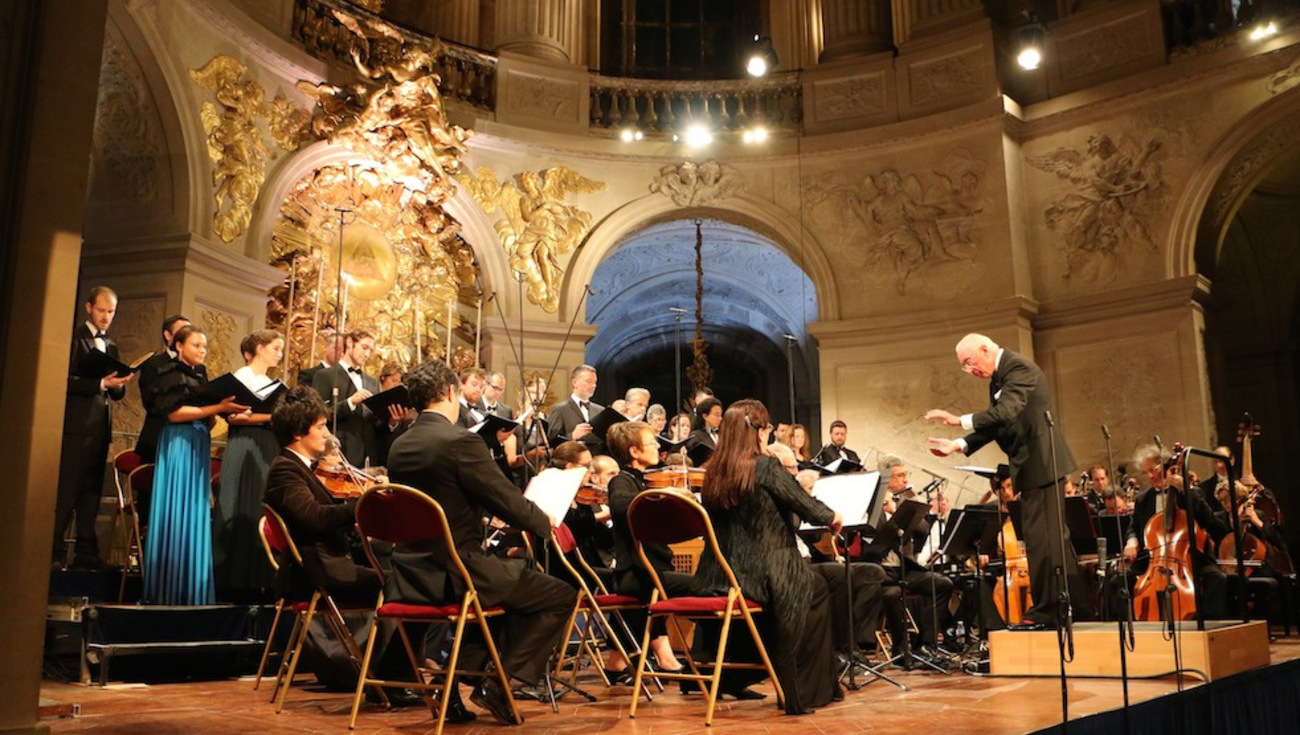Musical direction
William Christie
Cast
Rachel Redmond, Katherine Watson, sopranos
Reinoud Van Mechelen, high tenor
Cyril Auvity,tenor
Marc Mauillon, baritone
Cyril Costanzo, bass
Choir and orchestra of Les Arts Florissants
Program
Jean-Philippe Rameau, Quam dilecta
Jean-Joseph Cassanéa de Mondonville, Dominus regnavit
Intermission
Jean-Joseph Cassanéa de Mondonville, In exitu Israel
Jean-Philippe Rameau, In convertendo Dominus
Grands motets
Rameau and Mondonville
The genre of the French motet was painstakingly defined by a long line of masters and lesser exponents working at the Louvre and in the royal parishes. In the course of the 17th century they invented the national equivalent of the German cantata.
The grand motet, lasting about twenty minutes, was performed at the beginning of the Mass and was one of the three pieces of music heard by the King and his court at the daily religious services. It was followed by a short motet performed during the Elevation, and then by the Domine salvum fac regem, a final motet in which the full range of musical forces were brought into play. An inseparable part of the religious practice of the Ancien Régime, the grand motet is the supreme example of French sacred music.
Jean-Philippe Rameau, who composed for the churches and cathedrals of Avignon, Clermont-Ferrand, Montpellier and Dijon, produced a great number of sacred works to be performed by cathedral choirs. Only three examples from this highly creative period survive: In convertendo Dominum, Deus Noster Refugium and Quam Dilecta Tabernacula. A fourth motet, Exultet coelum laudibus, is thought to have been lost. These works predate Rameau's move to Paris and must first have been heard within the walls of Dijon and Lyon.
Joseph Casanéa of Mondonville, a native of Narbonne who died on the hilltops of Belleville, in Paris, was as well-known in his day as Jean-Philippe Rameau and far more celebrated. He conducted the famous Concert Spirituel and his grand motets combine emotion with a dance-like theatricality in perfect harmony with the decorative spirit of Sevandoni, the architect and decorator of Saint-Sulpice and of Saint-Bruno in Lyon.
The grand French motet is part of the genetic make-up of Les Arts Florissants who have led the way in the rediscovery of sacred music by Henry Desmarest, Rameau, Campra and Mondonville. Although quite often recorded, such works can only be fully appreciated in full-scale live performance, during which the prodigious talents of William Christie, the orchestra and, in particularly, the chorus of Les Arts Florissants will be displayed to the full.
The soloists, who all possess the high degree of technical mastery required by a genre situated between opera and introspection, include Reinoud Van Mechelen, Cyril Auvity and Marc Mauillon, three singers of exquisite musicality, the bass Cyril Costanzo, whose talent was discovered at the sixth edition of Le Jardin des Voix, and the sopranos Rachel Redmond and Katherine Watson.
Coproduction Les Arts Florissants – Centre de Musique Baroque de Versailles.
With the support of THE SELZFOUNDATION
Scores :
- Jean-Joseph Cassanéa de Mondonville, Dominus regnavit and In exitu Israel at Éditions des Abbesses, « Les Arts Florissants » collection (Sébastien Daucé – Fannie Vernaz).
- Jean-Philippe Rameau, Quam dilecta and In convertendo Dominus at Centre de Musique Baroque de Versailles Editions.
Previous dates
Royaumont / France
Abbaye
- Saturday, October 11 2014, 5.30pm
Poissy / France
Théâtre
- Friday, October 10 2014, 8.30pm
Versailles / France
Chapelle Royale
- Tuesday, October 7 2014, 8pm
Ambronay / France
Abbaye
- Saturday, October 4 2014, 8pm, Festival
Paris / France
Cité de la musique
- Thursday, October 2 2014, 8pm
London / United Kingdom
Royal Albert Hall - BBC Proms
- Tuesday, July 29 2014, 8pm
Beaune / France
Basilique Notre-Dame
- Sunday, July 27 2014, 7pm, Festival
Salzburg / Austria
Kollegienkirche
- Friday, July 25 2014, 6.30pm, Festival
Lessay / France
Abbaye
- Tuesday, July 22 2014, 7pm, Les heures musicales de Lessay









